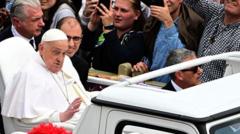The cardinals tasked with electing Pope Francis' successor must consider whether to continue his inclusive approach or revert to traditional practices. While some of Francis' initiatives have sparked hope among liberal Catholics, challenges remain in translating this progress into lasting change for a church facing declining attendance in the West.
The Legacy of Pope Francis: A New Era or a Distant Memory?

The Legacy of Pope Francis: A New Era or a Distant Memory?
As Pope Francis' tenure comes to an end, the future direction of the Catholic Church remains uncertain.
As the papacy of Pope Francis draws to a close, a pivotal moment approaches for the Catholic Church, with cardinals set to decide the future trajectory of the institution. Pope Francis, who has aimed to create a more welcoming, global, and collegial church, leaves behind a complex legacy that will provoke heated discussions among the cardinals.
Despite early optimism that the “Francis effect” would rejuvenate church attendance, the reality has been more sobering. While participation continues to dwindle in the secularized Western world, it remains robust in parts of the global South. During his leadership, Francis made important strides in tackling the church's sexual abuse crisis and its opaque financial practices, yet his direction for the future remains a debated topic among his followers.
Francis sparked excitement among liberal Catholics by addressing controversial theological matters—including divorce, married clergy, acceptance of same-sex couples, and women's roles within the Church—breaking a stagnant conservative trend that had persisted for over thirty years. Nevertheless, critics argue that he may have only initiated discussions, leaving the door open for a potential successor who may revert to a more traditional stance.
In reshaping the church's future, Francis significantly deviated from the paths set by his predecessors, Benedict XVI and John Paul II, a saint in his time but scrutinized for neglecting child sexual abuse within the church's ranks. He made concerted efforts to foster dialogue and accommodate differing viewpoints within an institution historically averse to dissent.
Under his leadership, Francis did not shy away from conflict; he took decisive action against conservative officials resistant to his vision, including the expulsion of the head of the Congregation for the Doctrine of the Faith. His outreach efforts aimed at rekindling relationships with the Muslim community stand out, particularly given the challenges faced by Catholic communities in predominantly Muslim regions. By securing critical agreements that upheld mutual respect and protections for vulnerable Christians, Francis demonstrated a commitment to inclusivity and dialogue.
Yet, despite his numerous initiatives and extensive travels, the transformative impact of his papacy on the church itself remains paramount. Through the appointment of thousands of bishops and over half of the College of Cardinals, Francis positioned the church on a path that prioritizes outreach to the poor, embraces marginalized groups, and elevates global issues like climate change.
In summation, as the Catholic Church stands at a crossroads, the election of Francis' successor will determine whether his visionary approach will endure or be relegated to the annals of history.






















